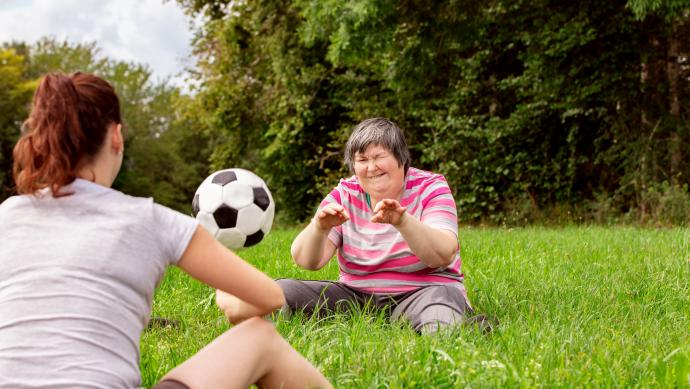The 13th European Congress of Mental Health in Intellectual Disability (EAMHID) was held in Berlin, Germany, September 23 - 25, 2021. The central theme was 'From Science to Practice'. To kick off sharing the knowledge we have interviewed some of the keynote speakers. This is an interview with Nicole Strüber, specialized in neuroscience.
Research, intellectual disabilities, and mental health (or challenging behaviour). What comes to mind reading these key words?
Research on mental health issues is important for all of us. Focus on the brain. The individual setting of neuromodulatory substances in our brains influence how we process stress, i.e. how we deal with high demands, how well we can relax in the company of others, and many other aspects of our personality and therefore our mental health. Their individual functioning is in turn influenced by genes, by prenatal stress and early childhood interpersonal experiences. All this applies to all people, whether they have intellectual impairments or not. However, the negative impact of these deeply rooted difficulties in stress processing and attachment on our mental health might be even greater if accompanied by an impairment to put our problems into words, to communicate and thereby receive social support.
What is the main research objective/theme/focus of the study you will be presenting? What are the main results from your study?
We have long known that early experiences have a lasting effect on mental health. Early experiences of secure attachment form the basis for later mental health, whereas early experiences of physical or emotional neglect, of abuse or abandonment increase the risk of mental illness. Today, we know that one of the ways in which these experiences have a long-term effect on people, is through epigenetic labelling of genes of different neuromodulatory substance systems in the brain: cortisol, oxytocin, serotonin, and many others.
Changing epigenetic signatures, prenatal or early childhood stress experiences can have a long-term influence on the function of the cortisol stress system and hereby on how we deal with high demands. Early attachment experiences in turn shape the oxytocin attachment system in the long term and in this way our motivation and ability to form and maintain secure attachment relationships. From a neurobiological point of view, it is not precluded that these epigenetic signatures are reversible, for example when a person’s personality can mature in later attachment relationships.
Nevertheless, the effects on mental health are sometimes persistent. Here, vicious cycles may come into play. If, after early adverse experiences, people develop a dysfunctional stress system, it might hinder their ability to use social support as a resource, as well as the recovery of underlying biological stress physiology.
How might outcomes of your (previous) studies affect daily practice in the support of persons with ID and mental health disorders and/or challenging behaviour? How can daily care improve their support based on your study/work?
The assumption that mental problems are rooted in inadequately functioning biological systems implies that these problems cannot be solved by an appeal to insight or reason. Instead, new positive mental experiences must be practiced in close relationships, therapeutic or otherwise. Especially when people have problems accepting psychological support after early stress experiences, perhaps because their cortisol stress system overreacts or because their oxytocin system and thus the motivation to form interpersonal bonds has shut down, then physical closeness and touch can have a positive influence on mental health through stimulation of the oxytocin system. All this also applies, of course, when intellectual impairments hinder a person in reflecting on their own behaviour and state of mind in a differentiated way.
Can you suggest topics for future studies you will be working on? How can we better implement scientific findings in daily practices?
I consider research into the reversibility of the effects of early stress experiences to be very important. What significance does touch have for the development of the stress system? Can, for example, increased irritability in prenatally stressed children be prevented by baby massage? Can massages of pregnant women prevent the stress load from being passed on from mother to child via a calming influence on the maternal stress system?






